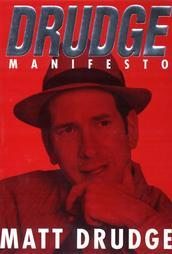Classics of Conservatism - part VI - Drudge Manifesto
Click here for previous editions of "Classics of Conservatism".
Today's classic book recommendation is Matt Drudge's "Drudge Manifesto".

Even though the book is relatively recent, we can benefit enormously by reviewing the events that catapulted the "new media" into the national spotlight. Drudge provides not only the history of his own page, but also commentary on the state of the old media.
The headlines and reports that changed history forever in January 1998 are reprinted with background on how Drudge's scoop eventually spilled onto the pages of the MSM/DNC (even though that term did not exist then).
This book is not a rehash of the Monica investigation. "Drudge Manifesto" is an introduction to the new media, how it works, how it started and why it is necessary. It is a little outdated in that blogs were not common when the book was published (2000). But the particular avenues that the new media would eventually take are not as important as the underlying "new media" concept. The idea of instant communication that could bypass [and ultimately even label] the MSM/DNC was not taken for granted in January, 1998 the way it is today.
Today, Drudge's book can accomplish two goals:
1) It can provide perspective to those of us who use the new media. We can gain a better understanding of where it came from and where it is going. The new media remains in its infancy, despite all of the advances in the past couple of decades.
2) It can provide an introduction to the novice who has heard discussion of "bloggers" and internet news, but is more comfortable with books and doesn't want to surf the internet. "Drudge Manifesto" is a great way to spread the word about the new media without expecting old-fashioned types to venture beyond their comfort zone.
Drudge's writing style is a little odd, but the reader gets used to it very quickly.
This book insures that January 17, 1998 will be remembered along with July 4, 1988 and September 8, 2004 as critical dates in the history of the media revolution that we now experience.


<< Home